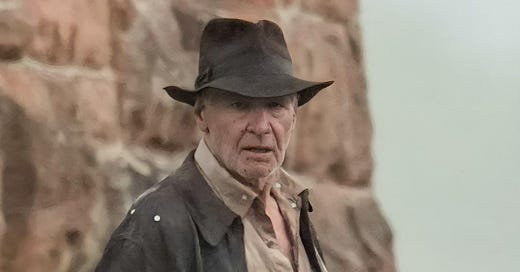As time permits, I’m doing more interviews on a range of subjects—offering hot (or cold) takes on everything from how to pursue a creative career to the Barbie movie.
This evening I’ll discuss the petition to give Duke Ellington the 1965 Pulitzer Prize with Shahidha Bari on BBC 4's show Front Row during the 7 P.M. hour (London time).
And this morning, my in-depth discussion with Derek Thompson of The Atlantic ‘dropped’ (what a charming word). We focused on why old stars are so dominant in popular culture.
Here’s a link to the podcast:
If you want to listen without going through Spotify, you should be able to do it at this link.
The Honest Broker is a reader-supported guide to music, books, and culture. Both paid and free subscriptions are available. If you want to support my work, the best way is by taking out a paid subscription.
Postscript: To be honest, the Barbie verdict was just a short exchange. If I recall correctly, it went like this:
INTERVIEWER: You’re very critical of movie reboots and remakes, but don’t the best artistic works of the past deserve to be celebrated and renewed?
TED: Well, yeah . . . but we’re talking the Barbie movie here.
Coming soon: The third (and final) installment of my “Gnarly Frank Zappa” essay; 20 predictions for the music industry in 10 years; and a big announcement about an exciting new extra for subscribers to The Honest Broker.





I listened to about 3/4 of the podcast.
Collapsing the price umbrella? The price umbrella had already collapsed. After file sharing became a thing in 1999, the party was over. The record companies spent the 90s not-releasing singles and forcing music consumers to buy $18 CDs full of filler. Then the industry thought suing kids and grandma was a brilliant PR move.
It was another 15 years, in 2014, before Spotify had even 15 million paying subscribers worldwide.
The "profitability eroded" over those 15 years. Paid download files were a stopgap that put a hole in the industry's greed scheme, but it was an unreliable revenue source similar to the changing physical media of yore.
The streaming services turned music consumption into a utility. Today, streaming provides a reliable revenue stream for artists, publishers, songwriters, record labels, and the rest of the industry. How is this solution a bad thing? I just came off my best month ever for royalties.
New artists don't need labels anymore. We use distributors. Publishing music has become completely democratized around the world. Gone are the contracts where we have to give up 85% of the profit, our master rights, submit to indentured servitude, or sign everything over to The Mob. Is there something wrong with that?
New artists can market on their own. That is, if you know how to market your music, your catalog, and yourself. But a lot of musicians out there don't know what to do, or they get extremely bad advice, and then they end up blaming Daniel Ek for the rest of their lives.
High earning musicians diversifying their investments and business opportunities is nothing new.
Did anybody really care that Michael Jackson was shilling for Pepsi? Or Jay Leno with that Doritos commercial that Bill Hicks made fun of? Nobody cares! Pepsi is sugar water. What did Steve Jobs say to John Sculley when he hired him at Apple? "Do you want to sell sugar water for the rest of your life, or do you want to come with me to change the world?" Ha!
Meanwhile, today you have every news outlet and "music reviewer" obsequiously pushing the latest Beyonce creation and clickbait fake controversy because they've been paid to do it.
And you wonder why kids these days want to listen to Kate Bush, early Metallica, or fall down the rabbit hole of lost oldies that radio never played or long ago gave up on.
I listened to the entire show. Fascinating topic, the disruption of how any art gets onto the screens we stare at and the speakers we listen to, every day.
Another interesting facet will be how blockchain technology, specifically NFTs, will empower artists to plug their art into a distribution channel that is exclusive, yet widely available to integrate, and which shepherds the art through the distribution value chain, even unto the point of resale.
Yes, NFTs are suffering through the end stage of the early age of piracy and negative environmental impacts, but once this age has passed into an age of regulation, commercialization, and de-carbonization, the future might be very bright indeed for these musicians to retain more control and profit from their art.
Excellent conversation, Ted. I finally cleared up some budget to subscribe to this Substack.